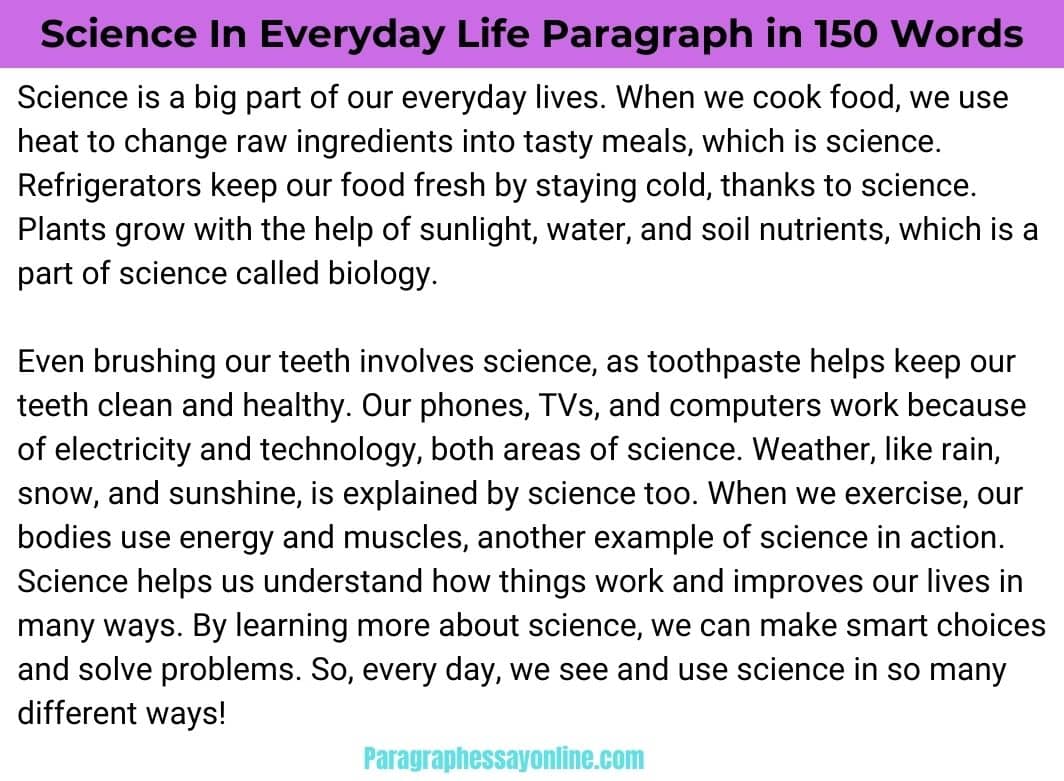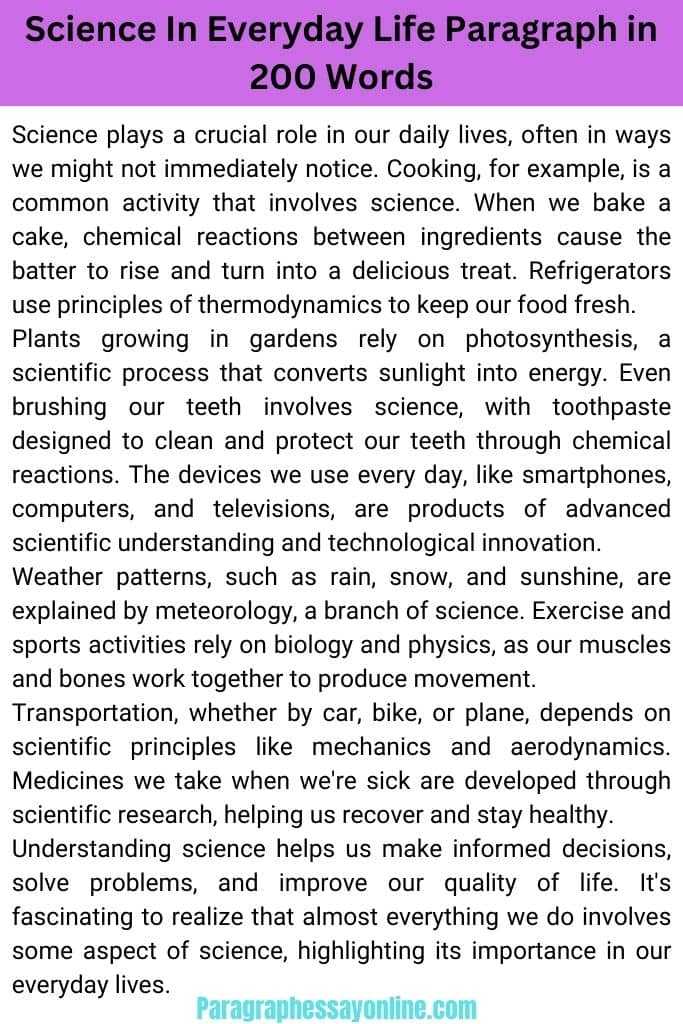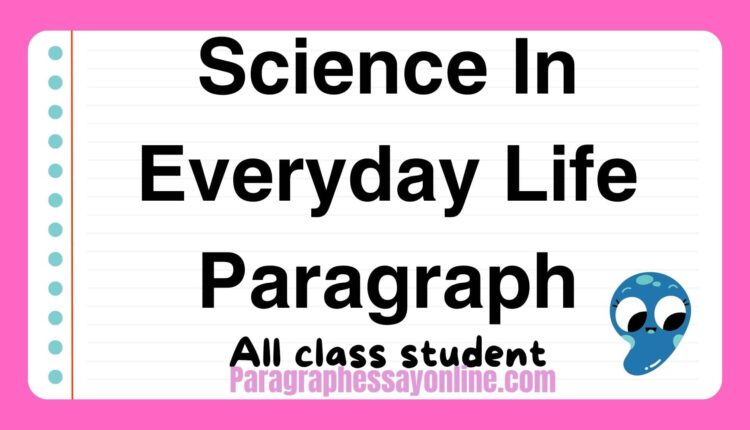Science In Everyday Life Paragraph
Science In Everyday Life Paragraph For All Class (Example 1-6)
Science is an integral part of our daily lives, shaping the way we understand and interact with the world around us, from the food we eat to the technology we use, making our lives more efficient, comfortable, and fulfilling.
Science In Everyday Life Paragraph 100 Words For 1, 2, 3 Students
Science is all around us in everyday life. When you cook food, that’s science. Your fridge keeps food cold using science. Plants grow because of sunlight and water, which is science too. Even brushing your teeth is science, using toothpaste to clean them. Phones, TVs, and computers work because of science.
When it rains, that’s a part of science called weather. Science helps us understand how things work and makes our lives easier and more fun. So, every day, you are using science without even knowing it!
Science In Everyday Life Paragraph in 150 Words For 4 & 5 Students
Science is a big part of our everyday lives. When we cook food, we use heat to change raw ingredients into tasty meals, which is science. Refrigerators keep our food fresh by staying cold, thanks to science. Plants grow with the help of sunlight, water, and soil nutrients, which is a part of science called biology.
Even brushing our teeth involves science, as toothpaste helps keep our teeth clean and healthy. Our phones, TVs, and computers work because of electricity and technology, both areas of science. Weather, like rain, snow, and sunshine, is explained by science too. When we exercise, our bodies use energy and muscles, another example of science in action.
Science helps us understand how things work and improves our lives in many ways. By learning more about science, we can make smart choices and solve problems. So, every day, we see and use science in so many different ways!

Science In Everyday Life Paragraph in 200 Words For 6, 7, and 8 Students
Science plays a crucial role in our daily lives, often in ways we might not immediately notice. Cooking, for example, is a common activity that involves science. When we bake a cake, chemical reactions between ingredients cause the batter to rise and turn into a delicious treat. Refrigerators use principles of thermodynamics to keep our food fresh.
Plants growing in gardens rely on photosynthesis, a scientific process that converts sunlight into energy. Even brushing our teeth involves science, with toothpaste designed to clean and protect our teeth through chemical reactions. The devices we use every day, like smartphones, computers, and televisions, are products of advanced scientific understanding and technological innovation.
Weather patterns, such as rain, snow, and sunshine, are explained by meteorology, a branch of science. Exercise and sports activities rely on biology and physics, as our muscles and bones work together to produce movement.
Transportation, whether by car, bike, or plane, depends on scientific principles like mechanics and aerodynamics. Medicines we take when we’re sick are developed through scientific research, helping us recover and stay healthy.
Understanding science helps us make informed decisions, solve problems, and improve our quality of life. It’s fascinating to realize that almost everything we do involves some aspect of science, highlighting its importance in our everyday lives.

Paragraph On Science In Everyday Life in 250 Words For 8,9,10 Students
Science is deeply embedded in our everyday lives, shaping the way we live, work, and play. From the moment we wake up, science influences our routines. The alarm clock that wakes us is a product of precise engineering and electronics. Breakfast involves science, too. Cooking eggs or toasting bread involves heat transfer, a basic concept in physics.
Our morning hygiene rituals, like brushing teeth, involve chemistry. Toothpaste contains fluoride and other compounds that clean and protect our teeth. When we travel to school or work, whether by bus, car, or bicycle, we rely on principles of mechanics and energy.
Plants and animals around us survive and thrive due to biological processes. Photosynthesis in plants is a fundamental process that provides oxygen and food. Even the act of breathing involves cellular respiration, a crucial biological function.
Weather forecasts help us plan our day, and they are based on meteorological science, which uses data from satellites and weather stations. Our smartphones and computers, integral to our daily communication and information access, are products of advancements in computer science and information technology.
Medical science is another area where we see daily benefits. Vaccinations, medicines, and healthcare practices keep us healthy and combat diseases. Exercise and nutrition, critical to maintaining our health, are guided by principles of biology and chemistry.
Science education empowers us to understand and solve complex problems. It fosters critical thinking and innovation, enabling us to create new technologies and improve existing ones.
Paragraph On Science In Everyday Life in 300 Words For 9, 10, 11, 12 Student
Science profoundly impacts our daily lives, often in ways we take for granted. From the moment we wake up, scientific principles are at work. The alarm clock that wakes us is an example of applied physics and electronics. Breakfast preparation involves chemistry and physics, from the browning of toast (the Maillard reaction) to the emulsification of eggs when scrambled.
Hygiene routines, like brushing teeth, are steeped in chemistry. Toothpaste contains fluoride and abrasives that chemically interact with dental plaque to maintain oral health. Our mode of transportation, whether a car, bike, or public transit, relies on mechanical engineering and energy principles.
The environment around us is a continuous demonstration of biological processes. Photosynthesis in plants is a critical process that converts sunlight into chemical energy, producing oxygen as a byproduct. Our own bodies function through cellular respiration, converting food into energy.
Weather forecasts, based on meteorology, utilize data from satellites and weather stations to predict daily and seasonal weather patterns. This information is crucial for agriculture, disaster preparedness, and daily planning. The technology we use, such as smartphones, computers, and the internet, is the result of advancements in computer science and electrical engineering.
Healthcare benefits immensely from scientific progress. Vaccines, antibiotics, and medical diagnostics are all products of extensive research in medical science. Public health initiatives rely on epidemiology and statistics to manage and prevent disease outbreaks.
Scientific literacy enables us to navigate complex issues like climate change, renewable energy, and sustainable living. It also fosters innovation, allowing us to develop new technologies and improve existing ones. Science education promotes critical thinking, problem-solving skills, and a deeper understanding of the world.
This understanding is crucial for making decisions that affect our health, environment, and society.
Science In Everyday Life Paragraph in 500 Words For All Students
Science is an integral part of our daily lives, influencing almost every aspect of our existence. From the moment we wake up, science plays a crucial role. The alarm clock that jolts us from sleep operates based on principles of physics and electronics. The breakfast we prepare involves chemistry and physics, whether it’s the Maillard reaction that browns our toast or the emulsification process in scrambled eggs.
Our hygiene routines are deeply rooted in science. Brushing our teeth involves chemistry, as toothpaste contains fluoride and abrasives that chemically interact with dental plaque to maintain oral health. The water we drink is purified through processes like filtration and chlorination, which are applications of chemistry and microbiology.
Transportation is another area where science is indispensable. Cars, bicycles, buses, and trains operate based on principles of mechanics, thermodynamics, and materials science. The internal combustion engine in cars, for instance, converts chemical energy from fuel into mechanical energy, propelling the vehicle forward.
The environment around us showcases continuous biological and ecological processes. Photosynthesis in plants is a fundamental process that converts sunlight into chemical energy, producing oxygen and food. This process is not only crucial for plants but also for the entire ecosystem, as it forms the base of the food chain. Similarly, cellular respiration in our bodies converts food into energy, enabling us to perform daily activities.
Weather patterns and climate are governed by atmospheric sciences. Meteorologists use data from satellites, weather stations, and computer models to predict the weather, helping us plan our activities and stay safe from extreme weather events. Understanding weather patterns also aids in agriculture, as farmers rely on accurate forecasts to plan planting and harvesting schedules.
The technology we use daily, such as smartphones, computers, and the internet, is a result of advancements in computer science and electrical engineering. These devices function through complex algorithms and electronic circuits, enabling us to communicate, access information, and perform a multitude of tasks efficiently.
Healthcare is one of the most evident areas where science has a profound impact. Medical science has led to the development of vaccines, antibiotics, and various diagnostic tools that prevent and treat diseases. Public health initiatives rely on scientific research to manage and prevent outbreaks, improving life expectancy and quality of life.
Nutrition and exercise, critical for maintaining health, are also guided by scientific principles. Understanding the nutritional content of food helps us make informed dietary choices, while knowledge of human physiology and biomechanics informs effective exercise regimens.
Scientific literacy is essential for understanding and addressing complex global issues such as climate change, renewable energy, and sustainability. For instance, knowledge of environmental science helps us comprehend the impact of human activities on the planet and develop strategies to mitigate climate change.
Science education fosters critical thinking and problem-solving skills, enabling us to innovate and improve our lives. It empowers us to make informed decisions, from choosing eco-friendly products to supporting policies that promote scientific research and technological advancement.
Recognizing the pervasive role of science in everyday life helps us appreciate its contributions and underscores the importance of scientific inquiry and education. This understanding is crucial for becoming informed citizens capable of making decisions that positively impact our health, environment, and society at large.
Most Important Paragraph:
| Say No To Junk Food Paragraph. |
| Moral Values Paragraph. |
| New York City Paragraph. |
| Population Explosion Paragraph. |
| Price Hike Of Essential Commodities Paragraph. |
Frequently Asked Questions Science In Everyday Life Paragraph
Q: What are some examples of science in everyday life?
A: Examples include the use of smartphones, computers, and medical technology like X-rays and vaccines. Science is also used in agriculture, such as in the production of fertilizers and pesticides, and in construction, such as in the use of building materials and machinery.
Q: How does science benefit humanity?
A: Science has greatly benefited humanity by improving our quality of life, eradicating diseases, and enhancing communication. It has also led to numerous innovations and discoveries that have transformed our world.
Q: What are some key terms related to science in everyday life?
A: Key terms include atoms, molecules, chemical reactions, physical reactions, compounds, electrons, protons, and other scientific concepts that are used in various applications.
Q: How can schools make science more interesting for students?
A: Schools can make science more interesting by incorporating hands-on experiments, field trips, and interactive digital resources. This can help ignite curiosity and encourage exploration among students.
Q: What are some common misconceptions about science in everyday life?
A: Some common misconceptions include the idea that science is only for scientists or that it is too complex for everyday use. However, science is all around us and is used in many aspects of our daily lives.
Q: How can individuals keep updated with scientific developments?
A: Individuals can keep updated with scientific developments by reading scientific journals, watching documentaries, and following reputable science channels online
